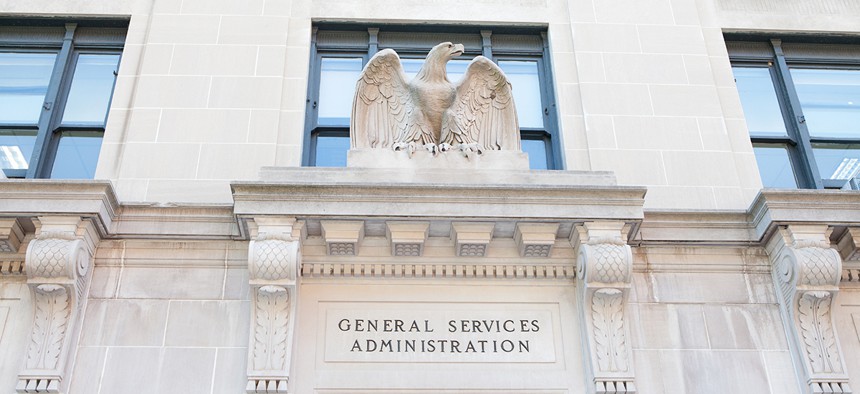Audit: 18F Spends More Than Half Its Time on Outreach, Branding and Other Non-Billable Activities

Mark Van Scyoc/Shutterstock.com
A report from GSA's Office of the Inspector General highlights 18F's inability to recover costs.
A federal tech consultancy composed largely of private-sector recruits doesn't have a plan to recover its costs, a watchdog report shows.
The General Services Administration's 18F has experienced a net loss of $31 million between the 2014 and 2016 fiscal years, a report from GSA's Office of the Inspector General's Office of Inspections and Forensic Auditing. That loss is tied to “inaccurate financial projections, increased staffing levels, and the amount of staff time spent on non-billable activities," the report said.
"If billing discrepancies are left unresolved, GSA could be held accountable for augmenting appropriations for other federal agencies," the report said. The OIG has been conducting the evaluation since December of 2015, when "several senior GSA officials expressed concerns about the management of 18F to the OIG.”
» Get the best federal technology news and ideas delivered right to your inbox. Sign up here.
The 18F group, part of GSA's Technology Transformation Service, completes technology projects for other agencies on a fee-for-service model. 18F and the U.S. Digital Service, a White House tech team, were both under congressional scrutiny earlier this year, and GAO reports highlighted financial and management-related problems in both groups.
18F functions under a memorandum of agreement that dictates GSA's Acquisition Services Fund must cover its operational costs. The memorandum also outlines that 18F must recover its costs from other agencies to reimburse the fund through formal agreements with agencies and a rate-per-hour for labor. The group has not presented a “viable plan to achieve full cost recovery,” which the memorandum requires, according to the OIG.
The group's goal is to break even: According to an 18F analysis, the best-case scenario would be to reach that point in the 2018 fiscal year, ending with a profit of $7.43 million.
Internal records showed 18F senior management wasn't all that concerned with cost recovery. In February, 18F's director of operations said, "to be frank, there are some of us that don’t give rip about the losses," the OIG found. GSA Regional Administrator Andrew McMahon said, “Sure, in the end, I could care less. ASF loses money all over the place. That's the decision we should reiterate with [GSA Administrator Denise Turner Roth], do you care about losing +$2.5M in order to bring in 100 more great hired [sic] into government?” the report found.
Staffing pressures have been contributing to that loss; between April 2014 and March 2016, the group grew from 33 to 201 full-time employees. But less than half of their time was spent on billable projects, the report found, with about 52 percent devoted to "non-billable activities such as outreach promoting 18F projects and accomplishments, developing an 18F brand, and developing an internal timekeeping system.”
Staff spent almost 14,000 hours—valued at an estimated $2.34 million—on promotion through blog posts, social media and speaking engagements, and 727 hours—an estimated $140,104—on developing a brand, including a logo redesign. About 20 hours, or $4,148, were spent creating two bots that function within the productivity tool Slack: one flagged potentially sexist phrases before the user sent a message; another, called “Coffeemate,” matched 18F staff for informal meetups.
Generally, senior managers have an "established a pattern of overestimating revenue projections,” the report said. In fiscal 2014, 18F’s managers had projected $4.76 million in annual revenue “but ended the year with zero revenue billed or collected.” The following year, 18F expected $32.58 million but only generated $22.26 million; it projected $84.18 million for fiscal 2016 but has only generated $27.82 million by the third quarter.
The group has been lax in managing its reimbursement agreements; in about 202 projects between June 2014 and April 2014, there were many cases in which "18F staff performed work before agreements were executed, outside specified periods of performance, and without required CIO approval," the report found. "[S]ome agreements lacked signatures from required signatories, risking the validity of the agreements."
The group's billing process, which is manual, coupled with "untimely timekeeping and expense recording” led to inaccurate charges, the report found.
OIG recommended 18F create a viable plan for full-cost recovery; establish controls so billings are accurate; ensure GSA's CIO reviews all 18F work for internal organizations and that 18F's work isn't done outside the reimbursement agreement, among others.
GSA management agreed with the recommendations and planned to take action, the report said.
“As is the case with startups in the private sector, we have been learning to scale and improve our organization. During our first two years, we grew quickly and focused on delivery," 18F staffer V. David Zvenyach wrote in blog post published Monday. "We have made many improvements over the last few months to address the issues outlined in this report and will take all additional actions necessary."





